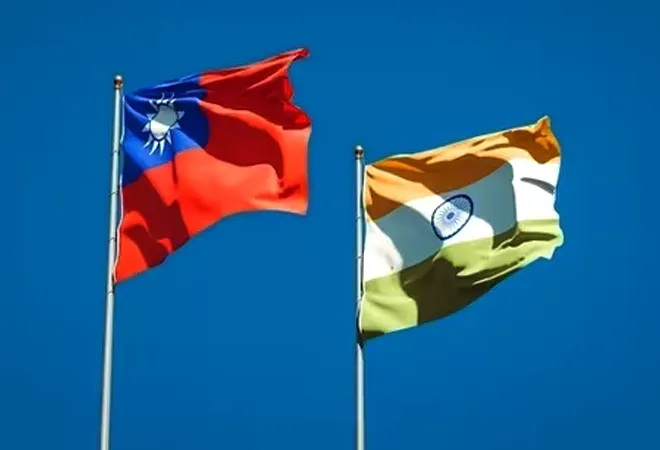-
CENTRES
Progammes & Centres
Location
India needs to consider the political and military consequences of a potential Chinese invasion of Taiwan and formulate a policy to support Taiwan's freedom

After the March 1969 Ussuri River clashes between the then Soviet Union and China, New Delhi faced a major foreign policy dilemma. As India-China relations soured in the late 1950s and hit rock bottom after the defeat in the 1962 war, India needed Moscow to balance Beijing, both militarily and diplomatically. During the Cold War, Moscow’s estrangement with Beijing was a significant leverage for Indian diplomacy to restrain China’s expansionist ambitions and to keep the former favourably inclined towards New Delhi. Sino-Soviet tensions also distracted Mao’s China from amassing substantial troops on its southern border. Yet, a hot war between Eurasia’s two giants was a diplomatic nightmare. Not only would Moscow expect India to take a clear stand, but it would also draw the US in China’s favour.
New Delhi, therefore, wished for the crisis to continue but not blow over. A cold war between the Soviet Union and China gave New Delhi the best of both worlds. It would remain salient in Moscow’s strategy without clearly identifying with the Soviet Union, yet it would also create enough anxiety in Beijing to seek a rapprochement with India.
A continuing state of crisis in the Taiwan Straits not only distracts China diplomatically and militarily, but also renders New Delhi invaluable to the Quad group of countries.
India’s approach to the Taiwan question today appears to be similarly defined by its hopes, rather than actionable policy. A continuing state of crisis in the Taiwan Straits not only distracts China diplomatically and militarily, but also renders New Delhi invaluable to the Quad group of countries. Therefore, India can continue to reap dividends from China’s misery and Quad’s anxiety. The continuous status quo works in India’s favour. However, the wish for peace and stability is just that – a wish – and in international politics, intentions and expectations hardly ever translate into outcomes.
The Indian strategic community seems to be waking up to the pressing policy dilemma that a prospective Chinese invasion of the island poses. Yet, the discussion on the implications of a hot war in the Taiwan Straits remains largely restricted to economic and diplomatic hardships for India. This is myopic.
Taiwan is not only the most probable flashpoint between the US and China in the Indo-Pacific, but it is also perhaps the region’s most consequential political and military pivot. Yet, there has been a rather limited inclination in India to understand the political and military consequences of China’s invasion of Taiwan.
A successful Chinese invasion of Taiwan will change the political and military balance of power in the Indo-Pacific. Politically, it would finally extinguish US hegemony in the region. Washington will most probably retract to the safety of its borders with Canada and Mexico, and fish in the Pacific and Atlantic Oceans. Even if it continues to confront China, no State in the region, including US allies, will take its commitments seriously. Southeast Asia will buckle up and prefer to bandwagon with the dragon rather than confront it. Middle powers such as Japan and Australia will face an acute political crisis: Either accommodate China or develop sufficient military deterrents, including nuclear weapons. Most importantly, a victorious Beijing will have no reason to accommodate India. The pressure on India’s borders will ratchet up because of the newfound confidence of China’s military and leadership.
The discussion on the implications of a hot war in the Taiwan Straits remains largely restricted to economic and diplomatic hardships for India.
The military consequences are far worse. Taiwan not only currently distracts China from amassing its expanding military power on India’s borders but also provides the US and its allies substantial military advantage in threatening mainland China with punitive military strikes. If Beijing conquers Taiwan, People’s Liberation Army (PLA) assets currently dedicated to the Taiwan theatre will be available to be deployed along its other unsettled border in the Himalayas. The constant refrain among the Indian military thinkers of PLA being untested in battle will vanish, and Indian armed forces will be forced to confront a highly motivated force. More importantly, Taiwan, along with other States in the first island chain, allows the US and other friendly powers to envelop PLA Navy in a small portion of the East and South China Sea. If Taiwan falls under China’s control, PLA Navy would be free of its military constraints. Its aircraft carriers and, more importantly, its nuclear submarines will break free from the cordon sanitaire of US naval forces. Having established its dominance in the South China Sea, PLA Navy will have far more resources to dedicate to the Indian Ocean.
India can hardly treat Taiwan like Ukraine; it is far more consequential than Kyiv could ever be. Indian decision makers calculated correctly that whatever India’s position on Ukraine may be, the US and its allies will continue to invest in India vis-à-vis China. The recent Modi-Biden meeting attests to the soundness of this policy. However, vis-à-vis Taiwan, the expectation from Quad will be substantial. And, the consequences of not taking a firm position will also likely be harsher. If India sits the conflict out, it would be foolhardy to expect any assistance from its Western partners. Even if China fails to annex Taiwan and suffers a military defeat, the danger for India will linger. The Himalayas is the only other geography, and India the only adversary, against whom Xi Jinping could retrieve his lost reputation in the face of such an eventuality.
Taiwan, along with other States in the first island chain, allows the US and other friendly powers to envelop PLA Navy in a small portion of the East and South China Sea.
New Delhi must face the political and military consequences of a hot war over Taiwan. It should at least start talking to Quad partners about its constraints and their expectations. It should formulate policy on a simple maxim: help others proportionate to the help one expects. New Delhi must contribute to the Quad’s effort to keep Taiwan free in the ways it expects support in case of a military confrontation with Beijing over the Himalayas. This is not to say that a war is imminent; it is just to underscore that New Delhi’s strategic horizons should include the changing power balance in the Taiwan Straits, and prepare accordingly.
This commentary originally appeared in Hindustan Times.
The views expressed above belong to the author(s). ORF research and analyses now available on Telegram! Click here to access our curated content — blogs, longforms and interviews.

Professor Harsh V. Pant is Vice President – Studies and Foreign Policy at Observer Research Foundation, New Delhi. He is a Professor of International Relations ...
Read More +
Yogesh Joshi is Indian Community Endowed Assistant Professor and Director, India Center. His research focuses on military technological diffusion among rising powers, conventional military and ...
Read More +